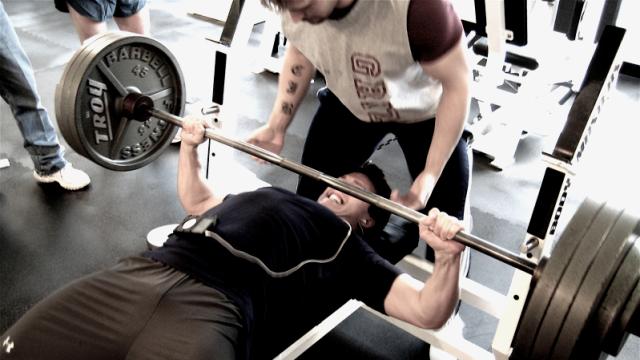When it’s time to go for broke with a new personal best in the gym, you may ask a stranger for a “spot”, which is fitness lingo for “help me out, bro”. You’re ready to crush this, you think… but what if the person doesn’t actually know how to spot and you get crushed? Worse, what if you both get hurt? Here’s why it’s a bad idea, and what to do instead.
Image by ResoluteSupportMedia.
Few situations call for a spot. Most commonly it’s when you’re attempting to lift big weights for a new personal best (usually with a bench press, overhead press, or squat), and don’t want to be squashed if things look bleak. In any case, when you ask for a spot, you’re entering an unspoken, fierce bond of trust that goes both ways.
You’re assuming that the spotter knows exactly how hard you can (or intend to) push, is perfectly capable of moving the weight you have (without hurting himself), and understands proper spotting technique and etiquette. But as this Wall Street Journal article astutely points out, most people in the gym have never been taught to spot.
Moreover, if the spotter has no idea what he or she is doing and/or has a pre-existing injury (like a bum shoulder or something), it’s a double-whammy in injury risk for both the spotter and lifter. Not to mention, that such heavy weight could pose an injury risk for the lifter anyway.
If you want to ask for a spot, here are things to keep in mind:
- Make sure the person you’re asking is a trained professional. Fitness trainers at the gym (usually) are more reliable.
- Communicate, communicate, communicate. Make your goal clear: how many reps you intend to do, how much and when the spotter should “help,” whether you’ve lifted this amount of weight before, etc.
As a spotter, you need to remember:
- You’re not there to lift the weight for the lifter; you’re there as a safety net in case something goes wrong.
- To the above point, you need to be prepared and alert the entire time. Things can go wrong at any time.
- There are stances and grips that can make spotting more safe for you as well. The WSJ article notes that “an alternating grip (one overhand and one underhand) with a narrower grip than the lifter” makes for a more secure way to grasp the bar in a bench press. For more tips on spotting properly, check out this article at Breaking Muscle.
Simply, if you’re in a situation in which you are asked to spot but don’t feel comfortable doing so because of inexperience or injury, the onus is on you to say no. For the rest of us, try to avoid asking strangers for a spot unless you’re confident no one will get hurt.
A Risky Weightlifting Courtesy: Spotting For a Bench Press [The Wall Street Journal]

Comments
3 responses to “Why It’s Dangerous To Ask A Stranger For A Spot”
Is it “bum shoulder” or “bung shoulder”
Why does this advice read like the spotter is there to pick up the weight. I would say that at most the spotter is lifting maybe 5% at most of the total weight when assisting on the last rep.
My experience has been that most poor spotters grab the weight too early and provide far too much assistance. The advice here about communicating when to help is good in that regard.
Also there is nothing preventing you from using the safety bars on the rack to stop getting “crushed” if things were to go wrong. If its a very heavy weight and your shoulder gives out, its highly likely a spotter is in no position to save you anyway.
Or alternatively, use a squat cage
Or don’t go to the gym. This article is stupid, you should know how to drop weights without hurting yourself before lifting heavy